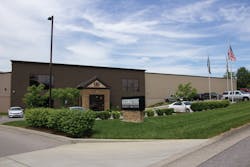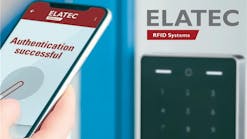There’s a real need for quality trade schools where locksmiths can get a top-notch education in a variety of specializations, including general security, automotive, combination-lock manipulation and electronic access control (EAC). There also are several government- and industry-regulated venues in which certification is required to do business. Lockmasters Inc. of Nicholasville, Kentucky, provides one place where you can go to do both, at the Lockmasters Security Institute.
Ricki Keaton, marketing manager with Lockmasters, says, “The institute has provided 30,000 students with an education since its beginning in 1955. We now offer 19 study courses with a variety of custom classes. Students can come here, or we can go to them.” Lockmasters also accepts the GI Bill for U.S. veterans.
Lockmasters started as a correspondence school, providing their students with a first-class education from a distance. The distant-learning component no longer is available.
“Today, there is no more correspondence, as we provide resident studies only,” Director of Education Deanna DeBorde says. “We have two facilities, one in the D.C. area [in Maryland] and the other in Nicholasville, Kentucky, although sometimes we do custom courses at someone’s facility.”
Hands-On Training
There was a day in the not-so-distant past when a locksmith shop would hire someone right out of high school, a mill or some other profession. The idea was, and still is, that hiring from inside the industry often means contending with bad habits acquired while working for other locksmith companies. Hiring someone outside the locksmith trade allows you to teach a new tech your own methods and techniques without distraction.
In a sense, an education at Lockmasters assures that a new trainee receives the best instruction without the frustrations associated with overcoming bad habits taught to them by others.
“Our instructors are locksmiths and safe technicians by trade with over 80 years of experience,” DeBorde says. “They are in the field doing the work, and the courses they develop and update reflect that real-world knowledge.”
You can send technicians to Lockmasters to learn the basics as well as specialized methods and procedures. Lockmasters makes sure that all of its policies are up to date, so the education you or your charges get is spot on.
“Education was the foundation of our business, and it still remains a cornerstone today,” Lockmasters CEO Mark Miller says. “My grandfather was passionate in sharing knowledge and educating those in in our industry, and I’m proud to continue that tradition.”
Specialized Certifications
In the highly specialized and regulated world that we live in, hands-on training isn’t always enough to win a contract. This is particularly true where certifications are required for specific pieces of hardware. Some organizations, such as the federal government, require certifications when working on specific locking systems.
“Certifications offered through many of our courses are becoming more of a requirement than nice to have, meaning end-user customers are needing and only looking for trained technicians with the proper certifications to perform the work,” Miller says.
Miller cites several examples, such as the institute’s Sargent and Greenleaf 2740B Certification course, the Kaba Mas X-10 Certification course and the General Services Administration (GSA) Authorized Safe & Vault Technician and Inspector Training & Certification course. The safe-and-vault course takes 10 days of on-site training to complete. This course is designed to provide a hands-on education in the approved methods of servicing, installing, diagnosing, troubleshooting, repairing and certifying GSA locks, vaults and containers.
This course also teaches students how to perform forced entry into GSA-approved containers. It’s required for a locksmith to perform this service either as an individual or as a business. If no one on staff has GSA safe-and-vault certification, someone within the company has to attend a school, such as Lockmasters, to gain the necessary technical knowledge and qualify for certification. Without this, the company can’t perform the work.
The objective of the GSA program is to establish standards of training and to certify those students who meet those standards. According to DeBorde, Lockmasters is one of only two institutions authorized to train and provide many of these credentials. It also has the most extensive collection of GSA-rated containers available for educational purposes. Because Lockmasters’ curriculum meets the requirements of GSA and Interagency Committee on Security Equipment committees, Lockmasters is able to educate, test and certify.
High-Tech Tools of the Trade
The tools of the trade in the locksmith world are increasingly high-tech. We’re seeing mechanical locks disappear and highly sophisticated EAC systems take their place. Lockmasters provides hands-on education as well as manufacturer certification(s) required to work on them.
“With high-technology incorporated in today’s hardware, education is ever so more important than before,” Miller says. “The factory certifications are also a big plus for our manufacturing partners, so they can call on those students for warranty and service work needed in the field.”
On the electronic side, learning how to install, wire, trim-out, program and commission a full-scale EAC system requires more than book learning.
“Our newly updated Access Control Technician training is unsurpassed,” Keaton says. “The students pull wires through ceilings and walls, install the boxes and hardware, make the power connections and test the systems. Our GSAII: FF-L-2740B Lock Drilling course is another one-of-a-kind class where a student actually drills FF-L-2740B locks, not the drawer.”
Lockmasters as a Learning Institution
According to Lockmasters, the lab areas of each classroom are unmatched. A typical locksmith-oriented classroom has more than 35 key machines as well as a double bay area suitable for the Institute’s PUREAuto training courses, which started in 2002.
“We’re proud to be one of the two facilities approved for certifying GSA Authorized Safe & Vault Technicians & Inspectors, which is held in the Safe Classroom.” DeBorde says. “It houses over 40 GSA containers, and our students have access to the many Lockmasters exclusive drill rigs and tools that we manufacture.”
Lockmasters’ Security Door Classroom Lab provides true real-world experience. It features five doors on which students can practice installing and servicing lock hardware and EAC systems.
“This includes the pulling of the correct cable to the power supply and controller panels,” Keaton says. “One of our newest courses, SCIF Acoustical Door Installation, required a mock SCIF room constructed to provide students with actual wall construction. Hence, Lockmasters is the only facility that I’m aware of where a student can physically install a STC 50 Door into a SCIF door opening.”
There’s little doubt that Lockmasters has covered most if not all the bases with its training facilities. What was already a top-shelf institution has become even better because of classroom training.
For more information, contact the school Monday through Friday, 8 a.m. to 5 p.m. Eastern time. Call 866-574-8724, email [email protected] or visit them on the web at www.lsieducation.com.
Lockmasters’ 2020 Course Lineup
The following 19 courses are offered by Lockmasters in 2020. Note that most are offered multiple times throughout the year in Kentucky and Maryland. Visit www.lsieducation.com for dates and locations, detailed class descriptions and registration information.
- Access Control Technician, LSI 160, 10 Days
- Combination Lock Manipulation, LSI 152, 4 Days
- Comprehensive Security Specialist, LSI 120, 10 Days
- Electronic & Mechanical Safe Lock Servicing, LSI 153, 5 Days
- GSA Authorized Safe & Vault Technician and Inspector Training & Certification, LSI 130, 10 Days
- GSA Inspector Certification, LSI 131, 3 Days
- GSA II: FF-L-2740B Lock Drilling, LSI 140, 2 Days
- Kaba Mas X-10 Certification, LSI 133, 1 Days
- LKM10K Lock Series Certification, LSI 137, 1 Days
- Physical Security SCIF Construction ICD-705, LSI 126, 5 Days
- Professional Locksmithing, LSI 150, 10 Days
- Professional Locksmithing II: Door & Door Hardware Installation, LSI 169, 5 Days
- Professional Locksmithing III: Door & Lock Entry Techniques, LSI 165, 5 Days
- Professional Safe Lock Opening, LSI 151, 3 Days
- PureAuto – Key Generation, 1 Day
- PureAuto – Advanced Automotive Transponders, 1 Day
- S&G 2740B Certification, LSI 134, 1 Day
- Safe Deposit Box Servicing, LSI 154, 2 Days
- SCIF Acoustical Door Installation, LSI 127, 2 1/2 Days






